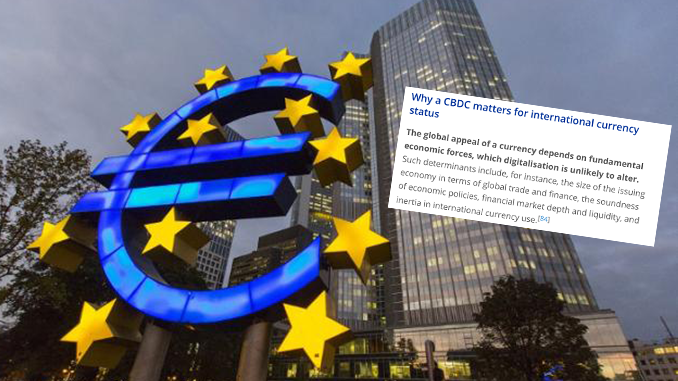
The European Central Bank has issued an appeal that is dramatic by its standards: those who miss the boat on the issue of state-guaranteed digital currencies could be overrun by the private market.
In the European Union, the rule is that EU policy is organized in Brussels, and the euro is organized in Frankfurt am Main. The monetary guardians of the European Central Bank do not always agree with the heads of government. Against this background, the latest ECB report on the euro certainly contains explosive material. For in a special chapter on Central Bank Digital Currencies (CBDC), the ECB writes: “The ability of central banks to fulfill their monetary policy mandate will be impaired if digital currencies for which they are responsible are not allowed. After all, private initiatives are on the rise in the stablecoin sector, even if Facebook’s Diem, for example, is still waiting in the wings.
At the ECB, the message comes across as a bit muddled, but it is likely to be directed at Brussels policymakers as well, not just third countries. The first task of central banks is to control price stability and inflation. To do this, they indisputably need to keep the money supply in check. Negative interest rates and rising inflation are already demonstrating in the EU how difficult this task is for the ECB. Other countries with weaker national currencies are groaning even harder under the consequences of the historically unprecedented loose monetary policy in the wake of the Corona pandemic. What the ECB means now is that if private stablecoins now also gain market share, a monetary policy sector will form that central banks can no longer influence.
E-Euro – the ECB pushes the pace
It is no secret that ECB chief Christine Lagarde is strongly in favor of an e-euro as a CBDC. It is just as well known that the German Bundesbank in particular, under President Jens Weidmann, does not think an e-euro is necessary. Actually, the ECB hopes to get the mandate from EU Brussels this summer to prepare for the introduction of the e-euro. Thus, the ECB report must also be read as a draft decision.
But even if the ECB gets permission from politicians for an e-euro, many unanswered questions remain. Will this CBDC guarantee anonymity? Will a true blockchain solution for an e-euro be pursued? Will the ECB then take over direct relations with private accounts of EU citizens in the future? Will the private banking sector in the EU lose important business areas? Should the e-euro also apply internationally or only in the EU? At least indirectly, the ECB leadership has probably come to the conclusion that inaction is the greatest risk.
Conclusion: E-Euro could soon take shape
The ECB has long since set up its own website here on a possible digital euro. There, the ECB assures that it will align itself with the wishes of EU citizens. That alone is complicated terrain. Securing the unanimous support of the EU heads of government and the national central banks for an e-euro is probably just as big a challenge for the ECB. But on the other hand, it is clear that anyone who wants to continue to ignore or block an e-euro as a CBDC will weaken the already battered confidence in monetary stability.
Best place to buy Bitcoin:

Leave a Reply